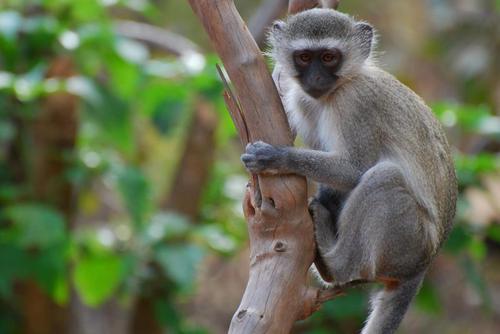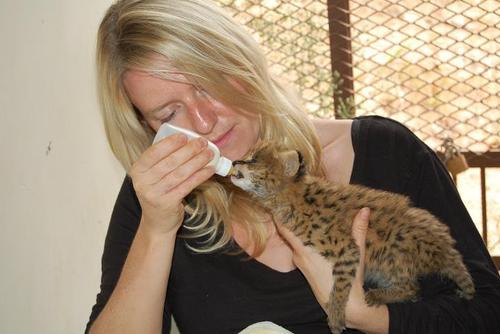Volunteers are crucial to the sanctuary’s rehabilitation and release programme – the project is focused on keeping wildlife in the wild, and releasing as many animals as possible back to their natural habitat. Volunteers participate in all these areas, plus learn about and care for orphaned and injured wildlife.
This is an amazing opportunity to get practical wildlife care experience, working towards animal releases, back into their natural habitat.
There are just under 200 animals in residence at the sanctuary including primates, carnivores, antelope, reptiles and birds. Most have been rescued as orphans or were victims of the illegal bushmeat and pet trade, others have been injured in snares, hit by cars or stoned by local villagers. Thanks to the state-of-the-art vet clinic, orphan care programme, experienced animal care team and dedicated volunteers, the majority of intakes can be managed on site.
What will I be doing?
Volunteers have the option to get involved with animal care and enrichment, learn veterinary skills and assist in community education programmes and tours. Most focus on wildlife rescue and rehabilitation projects, which can include:
Wildlife rescue, rehabilitation and release
The majority of animals are destined for release into the wild. No contact is allowed with adult primates, to ensure their survival skills are maintained for the best chance of a successful release.
- Help with pre-release monitoring to ensure animals are fit to be reintroduced
- Settle new arrivals and rehabilitated animals into groups and monitor progress
- Monitor released primates at one of the National Parks Primate Release Programmes
Orphan care
Baby and young orphaned primates are often in need of special attention, so your skills as surrogate parents are often called upon! Most animals need round the clock care so volunteers staying longer then 3 weeks will be given an animal to care for during their stay. Each animal has an individual care plan, supervised by staff.
- Surrogacy work may include owls, jackals, baboons, monkeys, antelopes and serval cats
- You may also be required to bottle feed orphans
Animal care
Volunteers play a vital role in the daily care of all sanctuary animals. You may be involved with caring for monkeys, birds, reptiles or antelopes – or any other new addition to the family!
- Cut browse for the antelopes and forage for food for animals such as hedgehogs (catching grasshoppers anyone?)
- Prepare food for the animals
- Clean enclosures and feeding pens
- Quietly observe sick and injured wildlife and spend time with distressed animals that need monitoring
Habitat enrichment
A critical role is to provide enrichment for the adult animals who cannot be released back into the wild. This includes sociable animals who need to be kept alone because of the stage of their release programme. Volunteer led enrichment can prevent the onset of stress behaviour by keeping animals stimulated.
- Build activity centres to encourage baboons to run, jump and climb
- Make toys for primates to stimulate foraging
- Observe and record behaviour
Veterinary support
Priority in this area is given to those studying Veterinary Medicine, but if you are interested in learning more, there is the option to participate in this area.
- Assist the on-site vet with basic surgical procedures
- Assist with vaccinations and health checks for new arrivals
- Contribute to disease screening projects
If you are interested in a Veterinary Internship Experience, please enquire for more details.
Wildlife research
Volunteers can also choose to participate in wildlife monitoring programmes, splitting their time between the sanctuary and National Parks. Research volunteers have the opportunity to participate in:
- Primate census surveys and reintroduction monitoring
- Bat diversity studies
- Insect and mammal surveys (large and small mammals)
- Elephant census surveys Please enquire for more details of these research opportunities.
Where will I stay?
Volunteers stay in a homely volunteer house in the heart of the sanctuary, surrounded by animals. There is mixed dorm-style accommodation sleeping ten volunteers and the house has electricity, hot and cold running water, kitchen, lounge and bathroom. There is also housekeeper who will do your laundry and make beds.
Three meals a day are prepared by the resident Malawian cook, Joseph, and tea and coffee is freely available through the day. Drinking water is also provided. On a Sunday volunteers take it in turns to prepare food or you can try one of the local restaurants.




